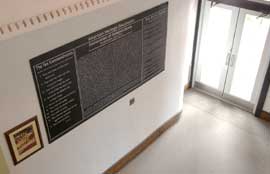
Ten Commandments display
Sullivan County Courthouse
Blountville, Tennessee
Federal judge considers another Ten Commandments case
The Associated Press 5-7-2002
NASHVILLE A federal judge heard two hours of arguments Monday on whether to order the Ten Commandments removed from the Rutherford County Courthouse. U.S. District Judge Robert Echols did not rule from the bench, nor indicate when he would rule on the request for a preliminary injunction filed by the Tennessee American Civil Liberties Union and several local residents.
Commissioners in Rutherford County, southeast of Nashville, voted in April to post the Ten Commandments along with eight other documents, including the Magna Carta, the Mayflower Compact and the Declaration of Independence. The county was represented by Erik W. Stanley, an attorney for Liberty Counsel, an Orlando, Fla. based group that describes itself as a civil liberties advocacy group devoted to preserving religious freedom.
Stanley argued that the Ten Commandments are historical as well as religious. "This is a historical display intended to convey a historical message," he told Echols. "The message we are sending is that the Ten Commandments and other religious documents have played a role in the foundation of our system of law and government." Nashville attorney George Barrett argued on behalf of the ACLU that the Ten Commandments are the only religious document in the display, and said that constitutes an endorsement of religion in violation of the First Amendment.
"What message do you send if you take all these secular documents and stick one religious document in there?" he said. "That it has the same weight as the others. That is an establishment of religion. It promotes a religion. It is an impermissible intertwining of state and religion." Stanley argued that a ruling Friday by U.S. District Judge Allen Edgar in a Chattanooga case should have no bearing on Echols' decision because the Chattanooga displays included the Ten Commandments only. Edgar ordered the display taken down.
Barrett made repeated reference to a Kentucky case handled by Stanley in which what he called "tinkering" the addition of non-religious documents in an effort to find something the courts would uphold-also failed to pass the court's scrutiny.
"History is replete with the disaster of government supporting one religion over another," Barrett said. `There is nothing more divisive than this. The founders were clearly mindful of that history." Rutherford County is the latest of several Tennessee counties to post the biblical laws. More than half of the state's 95 counties have approved the displays and more than 30 have posted the Ten Commandments some decades ago. Washington County in northeast Tennessee has had such a display for more than 80 years.
Back to Sullivan County Religious Wars

- Webmaster
- Restoring Reason
- Applying Reason
- Donate
- Bristol, Va.
- Science & Technology
- Hobby Electronics
- US Constitution
- Christianity Origins
- Religious Themes
- Environmentalism
- 10 Commandments War
- Humanism
- Thomas Paine
- Anti-Semitism
- Atheism
- Christian Activism
- Christian Militias
Quoting the Kingsport Times-News (1-18-2004)
Sullivan County Tennessee attorney Dan Street on the Ten Commandments,
"It seems clearer and clearer and clearer that we are promoting a particular religion, and that's a violation of the Constitution. The Constitution is the one document that protects minorities, and just because most people feel the Christian faith or the Jewish faith is the right faith, that doesn't mean they have a right to impose it on everyone else.
Plenty of Christians and Jews who may follow the Ten Commandments, but don't believe they should be displayed in public buildings. Most of the time, however, those people don't come forward with their opinion because they are afraid of being chastised. People think if you want the Ten Commandments down you're an atheist, and that's just not true.
- Christianity 101 Revealed
- Debunking the Khazar Jews Anglo-Saxon Israel Myth
- Why Jews Are Not a Race
- Questions on Christian Anti-Semitism
- Did Jews Kill Jesus Christ? No They Didn't
- Islam's History of Anti-Semitism
- Christian Identity A Religion for White Racists
- Christian Identity Dogma of Hate
- Christian Identity History of Hate, Irrationalism